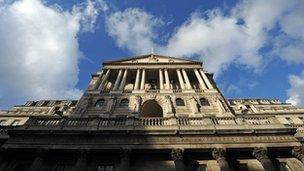Will strengthening banks weaken the economy?
- Published
- comments

Today's announcement by the Bank of England's Financial Policy Committee that banks have to raise an extra £25bn of capital by the end of 2013 represents a bit of history.
Never before has any British regulator instructed banks in this very public way to strengthen themselves.
Some will say stable doors and horses come to mind: it might have been more apposite if this had happened before the Great Crash of 2008, which wreaked so much havoc on the British economy in part because our banks had so little capital back then.
Better late than never, perhaps.
That said, senior bankers tell me they think it is a bit over the top. "Nobody at the Bank of England has given me a convincing explanation why our banks should have more capital than banks in the rest of the world," one sighed.
Well what the soon-to-retire governor, Sir Mervyn King, might reply is that there are few countries whose banks are so huge relative to the size of the economy. Ireland and Cyprus come to mind as economies where banks are a bit bigger relative to GDP, or economic output, and we've all seen what happened there when their banks ran out of capital.
But isn't there a danger, as I've mentioned here many times, that banks will hit their new capital ratio targets by shrinking lending, rather than finding new capital?
Well the FPC is instructing the new bank supervisor, the Prudential Regulation Authority, to stop that from happening: "The PRA should ensure that major UK banks and building societies meet the requirements…by issuing new capital or restricting balance sheets in a way that does not hinder lending to the economy".
We'll find out, at the cost of our own prosperity, if the PRA is up to this particular job. It is worth noting however that banks are big and complex, and have a lot of form in shrinking lending under the noses of supposedly watchful regulators.
The banks
So what are the implications for the individual banks?
Well the Treasury, Lloyds and RBS all tell me that Lloyds and RBS can find what they need without tapping impecunious taxpayers for yet more wonga.
And that looks credible. Of the £25bn total capital needed by all the banks before the end of 2013, ways of finding half of this have already been identified, says Andrew Bailey, head of the PRA.
Of the remaining £12.5bn, Lloyds probably needs to obtain an incremental £2.5bn, RBS probably twice that or more.
But both think that disposals of businesses and the issue of new-fangled loss-absorbing bonds, called CoCos, will cover most of that (as it happens, Barclays flogged some of these today).
For example, Lloyds can sell the rest of its stake in St James's Place, the fund manager, and also perhaps its holding in Visa.
RBS can further reduce what it lends and invests outside the UK (which would please the chancellor, who is very keen that RBS reverts to being a domestically focussed retail bank, with only a modest international presence and a shrunken investment bank).
As for Barclays, it too can probably raise the small number of billions it needs by scaling back outside the UK and selling more of those vaunted CoCos.
So one way of seeing what is happening today is that our biggest banks are being forced to become less global, less diversified and more focussed on their British customers.
If that makes them less big and complex, many would say that is a good thing. If on the other hand, it makes the banks more vulnerable to shocks in the UK, that's not necessarily brilliant for their owners (who include us, as taxpayers).
Of course there is one exception to this trend of banks becoming more British, which is the leviathan called HSBC. It will continue to be massive, sprawling and global, for one very simple reason: it has consistently held far more capital than its British rivals, and therefore is seen by the Bank of England as being strong enough to bear the risks of being everywhere.
So what does all this mean for when taxpayers can get shot of their (our) huge holdings in RBS and Lloyds, for the timing of privatisation?
Well since the Bank of England explicitly says that the £25bn needed by the end of 2013 is only the first instalment, that more capital will be needed in subsequent years so that banks can achieve the so-called Basel lll capital requirement in advance of the 2019 deadline, it is difficult to see RBS or Lloyds finding it easy to resume paying dividends - and, in the absence of dividends, it is a challenge to see how or when there will be the fabled privatisation.